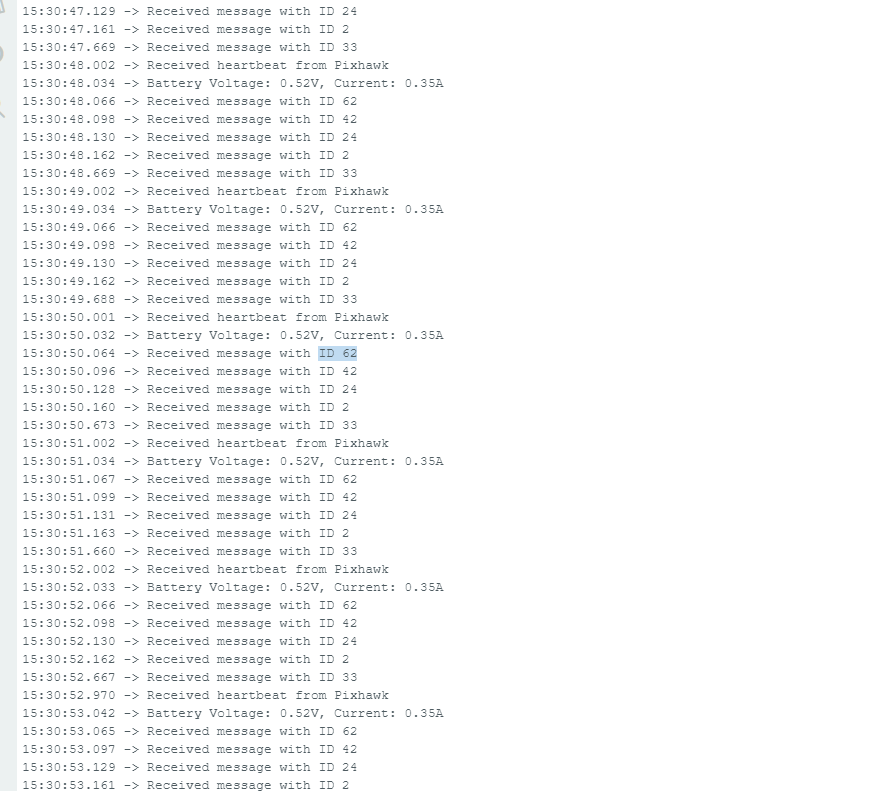Hi everybody,
I am working on integrating an ESP32 LTE module for telemetry communication using the mobile network. To achieve this, I plan to connect the module to my ESP32.
However, I am having trouble connecting my Pixhawk 6x to my ESP32. Despite my attempts, I cannot establish a connection, and I am not receiving any error messages to help me troubleshoot.
Here are the components I am using:
Firebeetle ESP32-E (for testing only)
Holybro Pixhawk 6x
JST-GH to Pins cable
This is my setup:
I am using the "Telemetry 1" port on my Pixhawk.
The Baud rate is set to 57600.
MAVLink Protocol is on 2, but I have also tested it on 1 and switch to 2.
Regarding the wiring, I have connected:
Pin 1 (Red) -> Vcc
Pin 2 (Black) -> GPIO 16
Pin 3 (Black) -> GPIO 17
Pin 4/5 -> Nothing
Pin 6 -> GND
I have also tried testing the connection by powering the Pixhawk with a power bank and only having GND connected. I have also tested it with only RX/TX connected.
Unfortunately, I cannot establish a connection between the ESP32 and the Pixhawk. I have read the documentation on serial communication and UART wiring, but I am still unable to get it to work. I have also tried other people’s code, but it did not work as expected.
I have created a proof-of-concept code block that should short the SoftwareSerial and Hardware Serial connections, essentially creating a USB-to-Telemetry1 interface, but this also did not work.
Could anyone provide me with guidance on what I am doing wrong? I would greatly appreciate any help to verify that I can interface my Pixhawk with my ESP32.
Proof of concept code:
#include <SoftwareSerial.h>
#define RX_PIN 16
#define TX_PIN 17
SoftwareSerial softSerial(RX_PIN, TX_PIN);
void setup() {
Serial.begin(115200);
softSerial.begin(57600);
}
void loop() {
// Read from USB serial and write to software serial
while (Serial.available()) {
byte data = Serial.read();
softSerial.write(data);
}
// Read from software serial and write to USB serial
while (softSerial.available()) {
byte data = softSerial.read();
Serial.write(data);
}
}
Full Code (not claiming full authorship, partially copied):
#include <WiFi.h>
#include <SoftwareSerial.h>
// Wi-Fi network credentials
const char* ssid = [REDACTED];
const char* password = [REDACTED];
// TCP server settings
const char* server_address = [REDACTED];
const int server_port = 5761;
WiFiClient client;
SoftwareSerial swSerial(16, 17); // RX, TX
void setup() {
Serial.begin(115200);
swSerial.begin(57600);
delay(10);
// Connect to Wi-Fi
Serial.print("Connecting to ");
Serial.println(ssid);
WiFi.begin(ssid, password);
while (WiFi.status() != WL_CONNECTED) {
delay(500);
Serial.print(".");
}
Serial.println("");
Serial.println("WiFi connected");
Serial.println("IP address: ");
Serial.println(WiFi.localIP());
// Connect to TCP server
Serial.println("Connecting to TCP server...");
if (client.connect(server_address, server_port)) {
Serial.println("Connected to TCP server");
} else {
Serial.println("Failed to connect to TCP server");
}
}
void loop() {
// Read data from software serial and send it over the TCP connection
if (swSerial.available()) {
int numBytesToRead = swSerial.available();
uint8_t* bytesRead = new uint8_t[numBytesToRead];
int i = 0;
while (swSerial.available() && i < numBytesToRead) {
bytesRead[i++] = swSerial.read();
delay(10); // Allow some time for the next byte to arrive
}
Serial.print("Sending message: ");
for (int j = 0; j < i; j++) {
Serial.print(bytesRead[j], HEX);
Serial.print(" ");
}
Serial.println();
client.write(bytesRead, i);
delete[] bytesRead; // Free the dynamically allocated memory
}
// Read data from the TCP connection and write it to software serial
if (client.available()) {
int numBytesToRead = client.available();
uint8_t* bytesRead = new uint8_t[numBytesToRead];
int i = 0;
while (client.available() && i < numBytesToRead) {
bytesRead[i++] = client.read();
delay(10); // Allow some time for the next byte to arrive
}
Serial.print("Received message: ");
for (int j = 0; j < i; j++) {
Serial.print(bytesRead[j], HEX);
Serial.print(" ");
swSerial.write(bytesRead[j]);
}
Serial.println();
delete[] bytesRead; // Free the dynamically allocated memory
}
}


